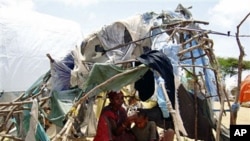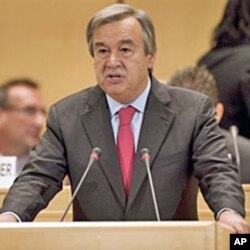The United Nations High Commissioner for Refugees, Antonio Guterres, is appealing to wealthy countries to shoulder more of the global refugee burden that now is overwhelmingly borne by developing countries. The UNHCR has just wrapped up its annual refugee conference in Geneva.
The UN refugee agency says the outlook for tens of millions of refugees and other people forcibly displaced from their homes is grim. It says the world is plagued with a stream of never-ending crises.
And a rise in drawn-out conflict is creating, what it calls, new semi-permanent global refugee situations. UN High Commissioner for Refugees, Antonio Guterres, says millions of people in conflict-ridden countries are on the move in search of a safe haven.
For example, he notes Afghans are asking for asylum in 63 countries - a third of all states in the world. He says 1.7 million Afghans, the largest number, are in Pakistan with more than one million in Iran.
He says Somalia is another example of a country where conflict has been raging for decades and people are desperate to flee.
"We have today almost 700,000 Somali refugees, plus 1.4 million displaced inside Somalia. And, again we see Somalis everywhere. And, again we see Somalis, particularly, targeted with all forms of discrimination and suffering dramatically, namely when in the hands of smugglers or traffickers," Guterres said. "And, some of them being killed, being raped, being tortured. A very dramatic situation, being rejected by societies everywhere."
The UN High Commissioner says the numbers of refugees returning home is declining dramatically. He says last year was the worst in two decades for the voluntary repatriation of refugees.
He says only 260,000 refugees returned home. He says this is a fraction of the average one million refugees the UNHCR has been helping to return to their countries of origin every year.
Guterres notes countries have increased their resettlement places for refugees who are unable to go home. Unfortunately, he says the number of places is not keeping pace with need.
The UNHCR estimates about 800,000 refugees need resettlement, yet only around 10 percent of that number of places is available.
Guterres says over half of the refugees for whom UNHCR is responsible are stuck in protracted situations. He says most of them are in developing countries where four-fifths of the world's refugees reside.
"What we see is that in most of these situations, host countries are left alone, almost alone and that is, of course, creating a huge burden on their economies and their societies and an increased tension in relation to the asylum capacity of those countries," Guterres said. "And, so, a much more active burden sharing both in financial assistance and in resettlement of refugees from the developed world is absolutely crucial."
The coming year marks UNHCR's 60th anniversary, along with the 60th anniversary of the Refugee Convention. Guterres is urging member countries to support the anniversaries with renewed commitment to helping the world's 43 million forcibly displaced people.





